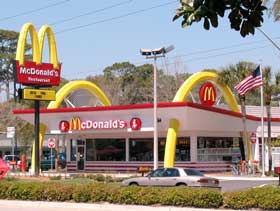Vol. VII, No. 2, February/April 2007
- Editor's corner
- Restaurant and entertainment expenditures
- New "networked" consumer more fluid and connected
- Knuckleheads eatertainment center opens in Wisconsin Dells
- Never old
- Foundations Entertainment University - April 24-26
- Wannado reduces prices
- Cultural differences
- American food goes upscale
- Visible glove use gives good impression
- Hero's The Party Experience
- Restaurant failures: The truth and the reasons
- Starbucks' 5 core principles for success
- McLattes on the way
- The silliness of most surveys
- New projects
McLattes on the way
If you think you'll never drive through McDonalds to order a Big Mac, super-size fries and a large caramel cappuccino with extra whip cream and shot of espresso, think again. The burger giant is test-marketing gourmet coffee drinks in its Michigan stores, to rave reviews.
 Watch out Starbucks, 5 core principles or not (see above story), McDonald's is on your tail when it comes to
upscale coffee drinks. It's taking a major step toward the rollout
of McCafé --
its new line of cappuccinos, lattes and mochas. In March, the company
made the drinks available in all its Michigan stores.
Watch out Starbucks, 5 core principles or not (see above story), McDonald's is on your tail when it comes to
upscale coffee drinks. It's taking a major step toward the rollout
of McCafé --
its new line of cappuccinos, lattes and mochas. In March, the company
made the drinks available in all its Michigan stores.
"We're the only ones in the country to have it," said John Betts, vice president and general manager for McDonald's Michigan region, which also served as the country's first statewide test market for McDonald's premium coffees two years ago (Consumer Reports magazine recently rated McDonald's premium coffees as better than Starbucks').
Last October, McDonald's quietly began installing expensive, Swiss-made drink-making equipment in all 531 Michigan stores. McDonald's now has more outlets selling lattes and specialty coffees in Michigan than Starbucks, Tim Hortons, Dunkin' Donuts, Panera Bread, Beaner's, Coffee Beanery and Caribou Coffee combined.
The drinks include plain, vanilla and caramel cappuccinos, hot and iced mochas, and hot and iced lattes in plain, vanilla or caramel flavors. Most are offered in small, medium and large (12-, 16- and 20-ounce cups).
What the company learns from its statewide test will help it fine-tune everything about the product from the types of milk it offers to its advertising strategies, Betts said. But some of the larger questions -- whether McBaristas, as the company calls them, can turn out quality cappuccinos, and whether espresso beverages have shed their elitist origins and been embraced by the masses -- have been answered: "Yes, and yes", he said, based upon earlier tests in Detroit.
"We tend to associate these drinks with certain brands or lifestyles or income levels," Betts said. "But we're finding that consumers are very, very aware of this product and they're thrilled to have it. And they're thrilled that because of our size, we can offer it at a little bit lower price point -- and at the speed of McDonald's."
Speedy service is crucial. So many fast-food sales, especially at breakfast, are transacted at the drive-thru window by customers who don't want to waste time parking and going inside. McBaristas are able to produce a drink made to the customer's specifications in 40 to 45 seconds because of the highly automated equipment.
The machine measures out the correct amount of coffee beans for each individual drink and then grinds and brews them under pressure with 2% or skim milk. It creates a foamy milk top for the drinks -- or not -- and can add extra espresso if the customer wants a stronger flavor. Syrups are optional.
Harry Balzer, vice president of the NPD Group research firm and author of the annual "Eating Patterns in America" report, said speed and convenience always have been the driving force behind what Americans eat. "About 35% of all coffee bought in a restaurant in the morning is a specialty coffee drink," he said. "What has been lost is that regular cup of coffee. ... You can see the regular joes dropping and the specialties coming up. That's probably the biggest trade going on: We're upscaling our choices."
According to Jon Campbell, owner of the McDonald's store on Michigan Avenue in Detroit, "We'll make it the way you want it." The machine there was installed in February. "We've had a lot of good feedback."
McDonald's prices run about 30 to 50 cents a drink lower than Starbucks' drinks of equal size. Regular lattes and cappuccinos at McDonald's are $1.99, $2.49 and $2.99; Starbucks' prices are $2.45, $3 and $3.30.
Vol. VII, No. 2, February/April 2007
- Editor's corner
- Restaurant and entertainment expenditures
- New "networked" consumer more fluid and connected
- Knuckleheads eatertainment center opens in Wisconsin Dells
- Never old
- Foundations Entertainment University - April 24-26
- Wannado reduces prices
- Cultural differences
- American food goes upscale
- Visible glove use gives good impression
- Hero's The Party Experience
- Restaurant failures: The truth and the reasons
- Starbucks' 5 core principles for success
- McLattes on the way
- The silliness of most surveys
- New projects


